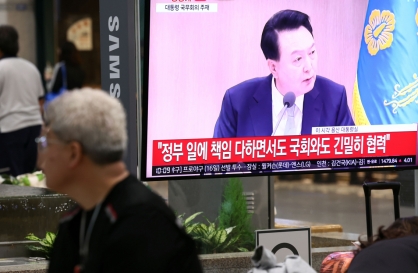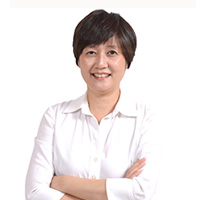[Kim Hoo-ran] Try to understand what makes Trump tick
By Kim Hoo-ranPublished : Sept. 6, 2017 - 18:08
 For nearly 70 years, the Korea-US alliance has stood strong. More than 30,000 US military personnel are stationed in Korea to deter North Korea. The two countries have fought together on the Korean Peninsula and in Vietnam, Afghanistan and Iraq.
For nearly 70 years, the Korea-US alliance has stood strong. More than 30,000 US military personnel are stationed in Korea to deter North Korea. The two countries have fought together on the Korean Peninsula and in Vietnam, Afghanistan and Iraq.In the decades since the Korean War ended in an armistice signed by the United Nations Command, North Korea and China, South Korea has made great economic development and achieved stable democracy. Korea is one of the best proteges of the US, it could be said.
In recent weeks, South Korea and the US demonstrated their “iron-clad” alliance through the annual Ulchi-Freedom Guardian military exercise and the dispatch of US B1-B bombers and US aircraft carriers to the Korean Peninsula, all aimed at deterring North Korean leader Kim Jong-un from further provocations.
On Sunday, North Korea carried out its sixth nuclear test. Pyongyang claims that it now has a hydrogen bomb that could be loaded onto an intercontinental ballistic missile capable of reaching the US mainland. Experts are in agreement that Sunday’s test nuclear explosion was its strongest yet.
US President Donald Trump reacted to the test by tweeting, among other statements, “South Korea is finding, as I have told them, that their talk of appeasement with North Korea will not work, they only understand one thing!”
At a time when the allies should be speaking in one voice condemning the test, Trump took to Twitter to criticize its ally for “talk of appeasement.” While President Moon Jae-in had been looking for dialogue with the North, dialogue does not constitute appeasement. Insisting that there shouldn’t be another war on the Korean Peninsula, which would be catastrophic not only for the peninsula but for the whole world, should not be attacked as “talk of appeasement.”
Adding salt to the wound, Trump was on the phone with Prime Minister Shinzo Abe after the North Korean nuclear test, not his South Korean counterpart. It was the next day before Moon was able to get on the phone with Trump. The two leaders are said to have agreed to “maximize pressure on North Korea using all means at their disposal.”
After the phone conversation, Trump tweeted “I am allowing Japan & South Korea to buy a substantially increased amount of highly sophisticated military equipment from the United States.” The White House confirmed the statement in a readout of the phone conversation between Moon and Trump, saying, “President Trump also provided his conceptual approval for the purchase of many billions of dollars’ worth of military weapons and equipment from the United States by South Korea.”
Curiously, this line was missing from the Blue House statement following the call. In fact, this was not the first time such an omission had been made in Seoul. The White House readout following the Moon-Trump phone call on Friday had also mentioned it, but it was not included in the Blue House statement on that phone call, either.
The presidential office’s subsequent attempts to explain the omissions have only resulted in more confusion. Ultimately, its responses may have contributed to resentment over what could be interpreted as Trump gloating about an arms sales at a moment of serious security crisis on the Korean Peninsula.
Adding fuel to Koreans’ resentment is Trump’s call for the US to withdraw from its free trade agreement with Korea. While revisiting various free trade agreements was a platform on which candidate Trump ran his presidential campaign, starting the talks at a very difficult time for South Korea smacks of being inappropriate.
Things are not as they used to be between the two allies.
Before North Korea demonstrated its ability to strike the US West Coast and threatened to shoot missiles toward Guam, South Korea felt secure in the Korea-US alliance. Seoul is now faced with a possibility of an all-out war on the peninsula that could be triggered either by a North Korean provocation or the US exercising its military option against Pyongyang. In either case, millions of lives could be lost.
We could go on assailing and resenting Trump, but that will not contribute to resolving the urgent crisis at hand. Rather than being anxious that Abe is Trump’s “phone buddy” when it is South Korea he should be consulting first -- after all South Korea will bear the brunt of any military action -- it would be more fruitful to try to gain an insight into Trump’s thinking. Such insight would be useful in understanding Trump’s words and actions. This is no time to dwell in anti-Trump sentiments or create further fissures in the alliance of seven decades.
By Kim Hoo-ran
Kim Hoo-ran is a senior culture writer at The Korea Herald. She can be reached at khooran@heraldcorp.com - Ed.






![[From the Scene] Monks, Buddhists hail return of remains of Buddhas](http://res.heraldm.com/phpwas/restmb_idxmake.php?idx=644&simg=/content/image/2024/04/19/20240419050617_0.jpg&u=20240419175937)








![[From the Scene] Monks, Buddhists hail return of remains of Buddhas](http://res.heraldm.com/phpwas/restmb_idxmake.php?idx=652&simg=/content/image/2024/04/19/20240419050617_0.jpg&u=20240419175937)

![[KH Explains] Hyundai's full hybrid edge to pay off amid slow transition to pure EVs](http://res.heraldm.com/phpwas/restmb_idxmake.php?idx=652&simg=/content/image/2024/04/18/20240418050645_0.jpg&u=20240419100350)

![[Today’s K-pop] Illit drops debut single remix](http://res.heraldm.com/phpwas/restmb_idxmake.php?idx=642&simg=/content/image/2024/04/19/20240419050612_0.jpg&u=)